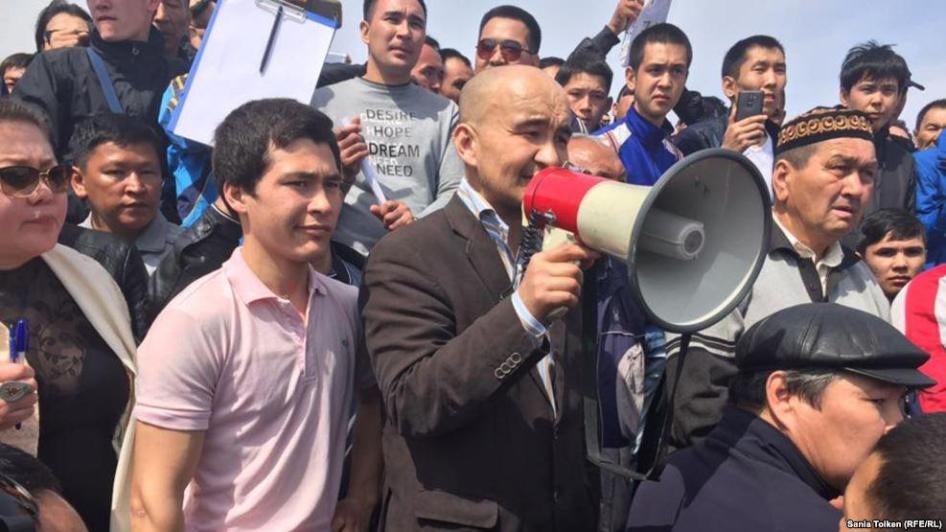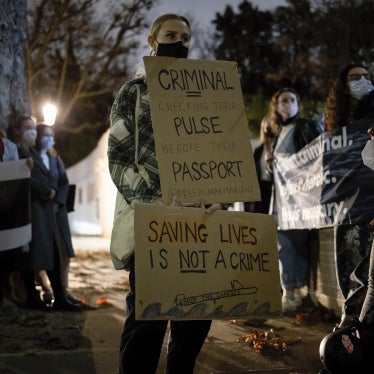(Berlin) – Central Asia's political leaders should focus on urgently needed improvements to basic human rights protections for their populations, as they deal with leadership succession and internal politics, Human Rights Watch said today in releasing its World Report 2017.
Central Asian leaders’ efforts to consolidate power in 2016, came at the detriment to human rights protection. In Uzbekistan Shavkat Mirziyoyev succeeded the former authoritarian President Islam Karimov in elections deemed undemocratic, while in Tajikistan President Emomali Rahmon intensified his personality cult amid the worst human rights crackdown in 20 years. In Kyrgyzstan President Almazbek Atambaev focused on constitutional changes and political battles with his opponents ahead of the 2017 presidential elections. In Turkmenistan, a new draft constitution would allow President Gurbanguly Berdimuhamedov to remain in office for life. Kazakhstan’s President Nursultan Nazarbaev, the last of the soviet-era leaders still in power in Central Asia, responded to an economic downturn with strengthening controls on basic rights.
“Many aspects of human rights protection in Central Asia are in crisis,” said Hugh Williamson, Europe and Central Asia division director at Human Rights Watch. “Rather than focusing on elite power politics or consolidating their personal positions, the leaders in the region should move away from repressive policies and take concrete steps to end torture in detention, allow free speech, and release critics from jail.”
In the 687-page World Report, its 27th edition, Human Rights Watch reviews human rights practices in more than 90 countries. In his introductory essay, Executive Director Kenneth Roth writes that a new generation of authoritarian populists seeks to overturn the concept of human rights protections, treating rights as an impediment to the majority will. For those who feel left behind by the global economy and increasingly fear violent crime, civil society groups, the media, and the public have key roles to play in reaffirming the values on which rights-respecting democracy has been built.
Authorities in Kazakhstan in 2016 jailed peaceful protesters, targeted outspoken activists with vague and overbroad criminal charges, and prosecuted independent journalists. Parliament adopted laws placing burdens and restrictions on nongovernmental organizations. The opposition leader Vladimir Kozlov was released on parole, but two activists were put on trial on politically motivated charges in connection with peaceful land reform protests. Impunity for torture persists and authorities restrict workers’ rights.
There were few meaningful improvements in Kyrgyzstan’s human rights record. Authorities failed to carry out a March 2016 decision by the United Nations Human Rights Committee calling for the immediate release of the imprisoned human rights defender Azimjon Askarov. Parliament rejected a draft law on “foreign agents” that would have demonized many nongovernmental groups, but another bill to allow discrimination against LGBT people is pending. Impunity for ill-treatment and torture remains the norm. In December 2015, the Kyrgyzstan government denied entry to a Human Rights Watch Central Asia researcher based in Bishkek. The ban remains in place.
Tajikistan’s human rights situation deteriorated sharply, as authorities sentenced the leadership of the country’s main opposition party to lengthy prison terms, imprisoned human rights lawyers and other perceived government critics, and predetermined the result of a constitutional referendum that will allow Rahmon, the authoritarian president, to remain president for life. Authorities organized and led numerous acts of retaliation, including incidents of mob violence, against relatives of government critics who are living abroad.
Turkmenistan remained among the world’s most repressive and closed countries, where the president and his associates have total control over all aspects of public life. The government ruthlessly punishes any alternative political or religious expression and exerts total control over access to information. Independent critics and their families, including those in exile, face constant threat of government reprisal. Authorities impose informal and arbitrary travel bans on activists and relatives of exiled dissidents, and others. Dozens of people remain forcibly disappeared, presumably in Turkmen prisons.
The installation of former Prime Minister Mirziyoyev as president failed to usher in any meaningful improvements in Uzbekistan’s abysmal human rights record. Authorities maintain rigid control over the population, severely curtailing the freedoms of association, expression and religion. Thousands of people remain imprisoned on politically motivated charges, torture is widespread, and authorities repeatedly harass rights activists, opposition members, and journalists. Authorities also forced over a million adults to harvest cotton during the 2016 harvest under harsh conditions, netting enormous profits for the government.









